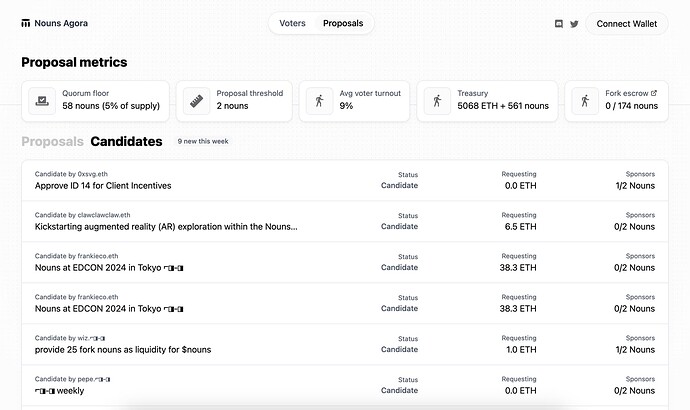GM ENS Governance,
Kent Fenwick here from Agora with a discussion topic around an upgrade that we are proposing we launch to the ENS Governor that will enable the feature of Proposal Bonds.
Why Proposal Bonds?
Proposal bonds allow anyone to bypass the proposal creation threshold of ENS which is relatively large, 100K ENS. Instead of needing to have that much voting power, a proposer can acquire less, say 500 ENS, or 1,000 ENS (configurable) and propose based on this lower threshold.
To prevent SPAM and encourage good proposals, we added a feature that was suggested on the MetaGov call a few weeks ago whereby you can vote:
- For
- Against
- Against No Return
- Abstain
If the weight of Against No Return > Against, then the proposer does not get their bond back and the proposal does not pass.
enum VoteType {
Against,
For,
Abstain,
AgainstWithoutBond
}
struct ProposalVote {
uint256 againstVotes;
uint256 forVotes;
uint256 abstainVotes;
uint256 againstVotesWithoutBond;
mapping(address => bool) hasVoted;
}
Other ways we could solve this problem
The goal of this PR is to start a conversation around how best to lower the threshold for proposing while still keeping the quality of the proposals high.
There were a few other ideas that were floating around include:
-
Allowing multiple users to come together and “sponsor” a proposal by amassing enough ENS to meet the 100K threshold.
-
A modified version of the sponsorship model pioneered by Nouns where Proposal Candidate ideas are posted onchain and exposed in a separate part of the client for users to browse and “back” with their sponsorship.
Example at Nouns Agora below
- Finally to something as simple as simply lowering the threshold of proposing.
We would love this to serve as jumping off point and Agora is happy to build out more potential upgrades that could show ENS how these kinds of collaborative and more proposer friendly models could work for the community.
Feedback we are looking for
Should we make it easier for people to propose to ENS?
If yes, what’s the best way?
At Agora, we love the Proposal Bond idea, but also have experience with the Proposal Sponsorship pattern that Nouns is using.
We would love this thread to serve as a discussion point and Agora is committed to building out whatever the community decides by eventually bringing this to a temp check / proposal.
Thank you for reading and looking forward to reading the comments and discussions below.
